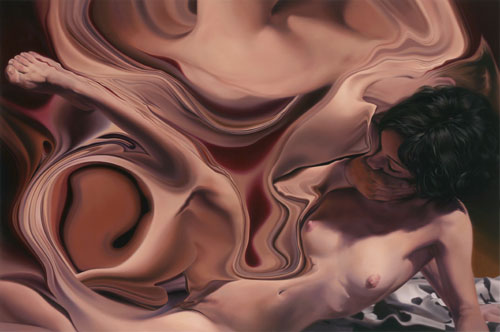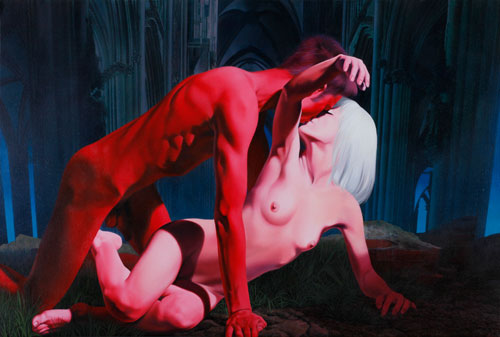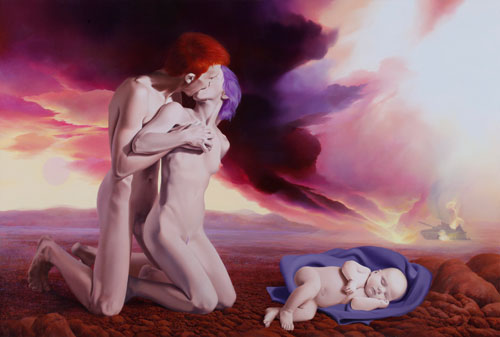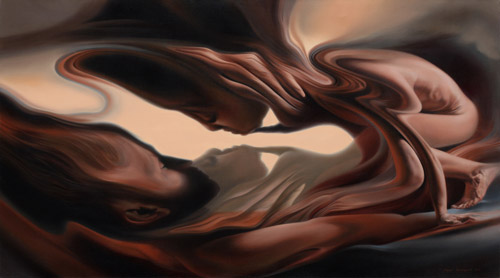
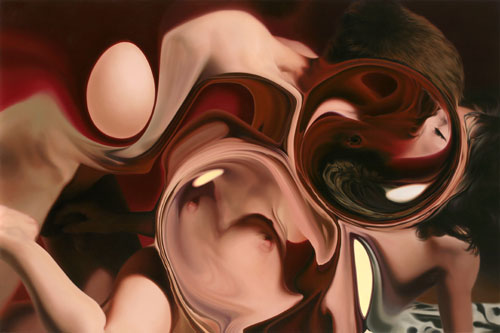
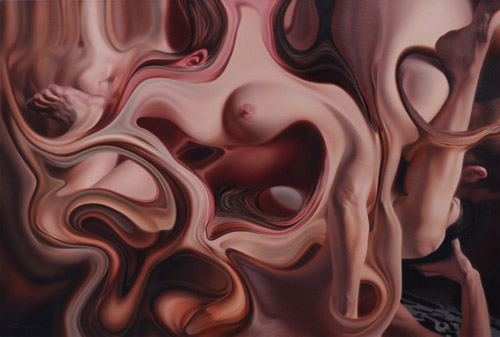
Series entitled "Together, yet apart" is consisted of paintings depicting a young couple’s intimacy. Distortions and scattered parts of their bodies are not only a result of an artistic expression – they aim to reveal drama and despair behind the shiny illusion of love. New and unexpected forms and motifs - like an egg or an embryo - emerge from such a turbulent flow providing the already recognisable fragments of the composition with the additional meanings.
The girl and the young man from each painting are friends of mine. Lives full of confrontations, disappointments and misfortune are not only their own – a huge number of young people all over the world live in a similar way, asking numerous questions both themselves and the entire society.
After completing the second painting from the series, I wrote a short story on the same topic. The story should have been an accompanying text. Bearing in mind that I have significantly altered my approach to the topic, the narration no more explains the paintings themselves but reveals what the couple experienced out of the paintings.
Together, yet apart
Those obsessed with their social status, career and money, who disregard other, predominantly emotional aspects of life, will never be self-contented and happy. Realising that, Ana left her studies of World Literature, and moved with David, a young man as old as she, whom she had met recently. Although her parents were not happy with her choice of University, the real reasons behind cancelling their financial support were personal ones: loss of their jobs, divorce and alcoholism. Disappointed and discouraged by her inability to find money for her scholarship, Ana realised that obtaining a degree in World Literature would not open the doors to career success anyway. Thus, she decided to find a job and live together with the man who was her kindred spirit.
The apartment, whose rent they were paying together, was near the Mall where they worked, as well as clubs which they visited every Friday or Saturday evening. Ana was working at the cash register, while David was working in the storeroom. Once a week, the dreamlike sight of numerous beautiful faces and bodies illuminated by coloured lights which disappear into and reappear from the darkness in the local DJ's rhythm, enhanced by the euphoria caused by LSD, made them temporarily forget everyday reality, their days filled with monotonous jobs, deprived of pleasant happenings and emotions. Drug addiction gradually became part of their lives. Unfaithfulness, arguments, and even fights became frequent and started to destroy their, once harmonious, relationship.
In rare moments when they were not working, or under the influence of some drug or medicine, they talked about themselves, their life together, future expectations. The only thing they were aware of was they inner emptiness and lack of any will or chance of change. Likewise, they could not ask anybody for help since everybody was entirely focused, like themselves, on their own preoccupations and problems.
Spring. Thousands of miles remote Iraq after the short but very devastating war gradually enters the period of rebuilding.
“The citizens of Iraq have new beginning before them in every way, as it should be with us, David”,
“New beginning?! Even if we could defeat our drug addiction, our lives would still be meaningless. We don’t have any possibility to advance in our careers or to continue our education – it is unlikely that we could provide our children with a decent life, or quality education. It is very likely that they would live like us, like our parents and most people around us.”
Although the idea of leaving to Iraq sounded reckless and childish at first, it started to grow on them. In entirely different surroundings it is possible to overcome the problems from the past and start all over again. They would save some money in order to get by when they come there. They would certainly find a job – many Western firms opened their representative bodies there. Ana could give English lessons...
“What about basic living conditions – apartment, healthcare, surroundings, security?”
“All that already exists here, but we were not able to get benefit from it. It is obvious that living conditions aren’t prerequisites for personal happiness. Europeans settling in New World centuries ago had similar dilemmas – to stay and accept their destiny or change it. They also left one well-ordered system and went to uncertainty. I am certain of one thing – there won’t be any opportunities for going out and indulging ourselves – this alone will make our lives healthier. We won’t spend our afternoons before TV or playing video games. All cheap pleasures of the consuming society will be unavailable to us. And, in case that we don’t make it, we can return here at any time.”
There were numerous disappointments waiting for them in Iraq. Thinking about potential difficulties is not the same as confronting them. The feeling of constant danger to their lives was harder on them than frequent food, water and electricity shortages. Such circumstances, however, directed them towards people surrounding them – new neighbours, acquaintances and, finally, friends were always ready to selflessly help them with different problems connected with finding their bearings in the new environment. Regardless of straitened circumstances, they shared everything expecting nothing in return.
“I have never had an opportunity to meet people like them before”, Ana said after a short pause, “and I’m not sure I fully understand them. On West, people from the Middle East are usually described as unenlightened, prone to destructive extremism, whose political points of view and religious beliefs repress the civic and personal freedoms. If more people travelled to Orient and introduced people that lived there, such point of view would certainly change. I would like to take my friends from here to visit my country, to show them... oh, yes, the great capitals and historical sites that were raised only thanks to huge profits made during numerous wars, by oppressing the masses, in colonies as well as in the capitals themselves. Apart from that, I am not so sure that I would be able to show them anything that they won’t be able to see here in near future. Many think that the globalisation will nullify cultural differences – the Christians, the Muslims, the Buddhists – they all will be surrounded by visually similar urban ambient, they will live similar lives, think the same. The World will be One. One Good, I hope...”
“Have you ever thought about return?” asked Sara, Ana’s friend who has just moved in and got the job in Embassy.
“No, honestly! Here I can see real life, future. Determination, strength and will with which people here face seemingly unbearable difficulties taught me uncompromising love towards life. And thanks to that love I feel that, for the first time, I exist as a human being. I’m staying. For now.”
Milan Hrnjazović 2010.
